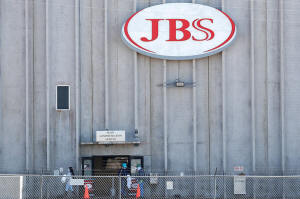JBS says China blocks beef from US plant over detection of ractopamine
 Send a link to a friend
Send a link to a friend
 [May 30, 2024]
By P.J. Huffstutter and Tom Polansek [May 30, 2024]
By P.J. Huffstutter and Tom Polansek
CHICAGO (Reuters) -Meat processor JBS said on Wednesday that Beijing
blocked U.S. beef shipments from the company's plant in Greeley,
Colorado, because traces of the feed additive ractopamine were
identified in beef destined for China.
Brazil-based JBS, the world's largest beef producer, said in a statement
it is working with U.S. and Chinese authorities to resolve the situation
and that no other JBS beef facilities in the U.S. have been impacted.
The suspension was effective Monday, according to a notice posted on the
U.S. Department of Agriculture's Food Safety and Inspection Service (FSIS)
website.
Ractopamine is a feed additive used to boost animal weights. Its use has
been banned or restricted in at least 160 countries, including the
European Union, Russia and China.
In addition, China has suspended exports of meat and poultry products
coming from Cool Port Oakland in Oakland, California, effective the same
date, according to a spokesperson from USDA FSIS.
Cool Port Oakland is a cold storage facility used for perishable or
other sensitive goods like food or medicine. The company did not respond
to a request for comment on Wednesday.
"China customs detected ractopamine in a batch of frozen beef omasum
products exported to China from these establishments and destroyed this
batch of products in accordance with their regulations," the USDA FSIS
spokesperson said in an email statement.
[to top of second column]
|

Employees walk around at the JBS USA meat packing plant in Greeley,
Colorado, U.S., April 14, 2020. REUTERS/Shannon Stapleton/File Photo
 USDA FSIS is conducting an
investigation, the spokesperson said.
Earlier this year, major food safety, environmental and animal
rights groups filed a lawsuit against the U.S. Food and Drug
Administration, seeking to force it to reconsider approvals of
ractopamine, which they say is putting human health at risk and
causing stress in farm animals prior to slaughter.
The restrictions sent Chicago Mercantile Exchange cattle futures
slumping on Wednesday, analysts said, with the most-active August
live cattle contract posting its biggest percentage drop since May
1.
(Reporting by P.J. Huffstutter and Tom Polansek in ChicagoAdditional
reporting by Lisa Baertlein in Los AngelesEditing by Leslie Adler
and Matthew Lewis)
[© 2024 Thomson Reuters. All rights reserved.]This material may not be published,
broadcast, rewritten or redistributed.
Thompson Reuters is solely responsible for this content.
 |